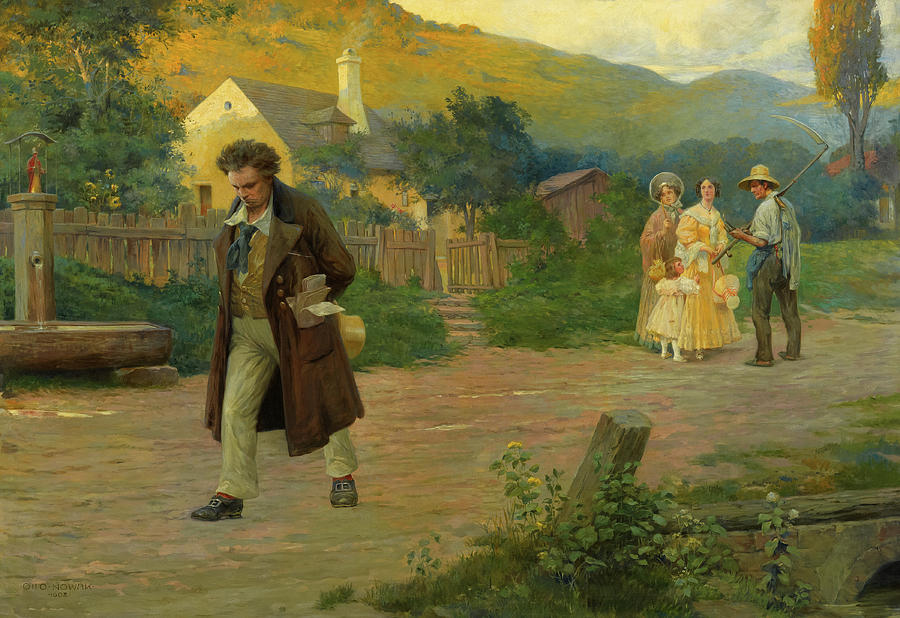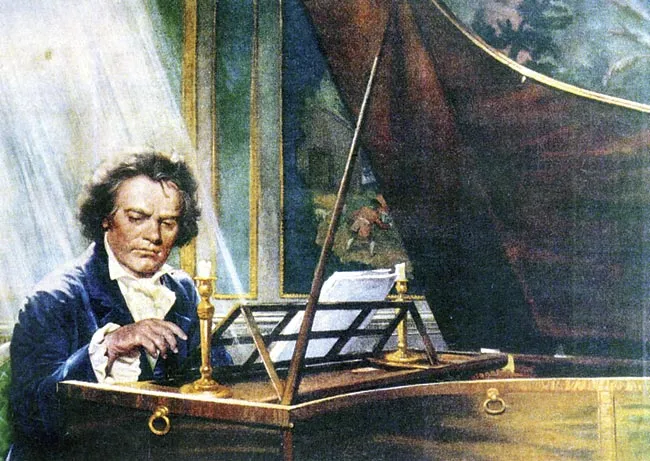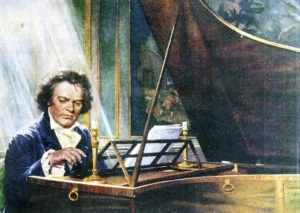👉 🇮🇹 Leggi qui il Saggio in versione ITALIANA.
Vienna, Theater an der Wien, May 7, 1824
From Schiller’s Hymn to Joy
Joy, sweet divine spark,
daughter of the blessed Elisei,
let us all enter together trembling
into your celestial temple.
Your magic reunites
what fashion, education and social conditioning have rigidly divided:
all human beings become sisters and brothers
under your delicate wing that vibrates love.
(…)
Embrace each other, multitudes of men of the world!
We are one great kiss of love for the world!
Brothers! Beyond the firmament, up there,
there must surely dwell a Universal Consciousness of Love.
SINGING THE FINALE OF THE NINTH SYMPHONY: a call to Awakening for humanity
The last great Opera in the service of humanity, composed by the now great Master of masters, the Sagittarius-Centaur Beethoven, and performed in 1824, is a window on today’s reality.
With his arrow of Consciousness of Love sparkling and clear, he declares his teaching, adapting for his purpose the moving words of Schiller.
Symphonic instrumental music is no longer enough, the degradation of men has irreversibly expanded, the dark age has reached its peak, and a clearer and more direct call is needed: men speaking to other men, explicit, evident words.
Oh, men, who have fallen so low, oh scattered and blind multitudes, dragged by individualism and the power of money, oh you who run after a material success that will nail you in the lowest dimensions, oh multitudes, listen! Remember who you are!!!
We are a gesture of great Love, of infinite Love that came from the Stars, for the completion of a profound and absolute evolution, in which Consciousness moves towards the stage of Supreme Freedom, aware of itself and its choices.
Oh men, let us reunite, in the One that we are!
PRESTISSIMO
So the FINALE begins with a PRESTISSIMO, there is urgency, we can no longer wait, let us not let our brothers burn in the Hell of material confusion, in the misery of separation.
Throughout the Symphony appears this urgency, this Sagittarian rush to communicate with impetus and fire, Fire of Love directed, following the gesture of Prometheus, to bring true knowledge to dispersed and suffering humanity.
So when for the first time the theme of Friendship appears (Joy is nothing but the sensation of Union and complete Communion between men and higher dimensions), the theme must be as simple as possible, understandable by all men, even those already enveloped in darkness. And so it appears for the first time first contrasting the darkness that is devouring the world, then it appears in the bowels of the earth with serious and sad frequencies, to then rise with cellos and then the vibrant violins ever higher.
And the rhythmic variations proposed reiterate the theme, bringing it to the clear comprehensibility of the listeners, as a peremptory gesture of calling, like a current of wind that drags ever stronger, penetrating the houses, until it awakens the first man: the solo baritone, who feels the call within himself and awakens to the superior state of consciousness of the Union.
Friends, not these notes, not this obscene and hysterical music, which surrounds us, capable only of transmitting disharmony, confusion, discomfort, stress! Discos, supermarkets, offices, shops, shopping centers, train stations, airports, radios, televisions, the internet, our homes: everywhere the world has filled up with diabolical whistles and noises, fake unnatural sounds, which are not music to elevate the soul, but sneaky strategies to nail the human brain into unconscious slavery.
Not these notes: but the harmonies capable instead of lifting us towards the Consciousness of the dimensions of Love!
This is what the baritone sings, the first man alone to have understood and to dare the announcement.
And here other men begin to respond…
Yes, that lost, forgotten sensation, that comes from the heart. The Joy of looking into the eyes of another human being and recognizing in them one’s own misery and one’s own suffering. The Joy of feeling united and no longer alone and separate, in competition and in competition towards a material and selfish goal, which makes only a few win, and the multitudes suffer.
And here the chorus begins to join, but still without the sopranos. They are still subdued vibrations of awareness, which gradually rise from the earthly level.
Anyone who has managed to achieve the success of living a pure disinterested friendship, or of loving another human being unconditionally, can experience this sensation of pure Joy of Love.
And here finally the soprano soloist joins in and the melody opens up to the highest frequencies, and here then the full choir responds to the soloists with a declared forte, finally!
“Yes, it is so: whoever has truly been able to love in life in a disinterested way, without manipulative ends, has reached the true apex, has reached the opening of the heart to the highest dimensions of Joy, rising from miseries and suffering forever”
And the blossomings begin to rise, the melodic flights of jubilation and freedom, which drag higher and higher, with the slurs for two of the usual ones and then of the choir, and which open to the first great climax: there can only be a Great Universal Consciousness up there in the firmament, the common source from which we all come!
The Allegro assai vivace begins with a pianissimo in 6/8, a continuous, almost frenetic, beating tactus that opens the march of all the reunited souls, who now move in the world as conscious bodhisattvas, to bring the announcement of help together with those who have remained in the material earthly dimension.
Those who have awakened to a profound union with the divine are now up high, in vibrations of pure joy, and shine, like the stars that move in the sky, to shed light on those who still move crawling on the ground, like a worm prey to passions, slave to their own sexual energy, their own individualistic desires, their own interests in power and personal success.
The voice of Tenor Solo now rings out like a trumpet, accompanied by the orchestra that vibrates with the sounds of silver cymbals and crystal bells.
The current of the call spreads throughout the world, reaching even the most remote places, to reach the brothers who suffer, who still delude themselves into thinking they can find freedom in a business meeting, on a vacation at a resort, in a sexual union.
Then suddenly a sudden plan. From this point on in the Finale Beethoven begins to play his most spectacular special effects, he puts into action his true mastery, which will keep us riveted until the last note, pouring into us his energies of a high Sagittarian master. Received as a legacy from the Baroque, Beethoven begins to use extreme changes in dynamics, combined with a rhythm that drags more and more, with alternations of moments of microscopic intimacy and devotion, which nourish the soul until it overflows outside the body, conscious of being Other.
Here begins an echo of the horns, which spreads more and more and which flows into the great CHORUS in full voices (bar 543 of the Finale), supported by the strings in rapid movement below, with the triplets of the 6/8 time that electrify the singing of the choir.
ANDANTE MAESTOSO
Suddenly the forte is suspended, to give way to an ANDANTE MAESTOSO in 3/2, in which the men call to the universal embrace, to which all the voices then join:
Embrace each other, oh multitudes of men!
Make of the internal world a single, great kiss!
Brothers! Beyond the firmament
there is only one Universal Consciousness.
The repetition of the last words
Beyond the firmament
there is only one Universal Consciousness
becomes more and more marked, sung only by men, to then be softened by the entrance of the women who, with their tender voices, prepare the following culminating moment, the heart of emotion and beauty: ADAGIO MA NON TROPPO, MA DIVOTO in 3/2 meter.
Adagio, ma non troppo – ma divoto. A truly particular indication proposed by Beethoven.
DEVOTION: without devotion, without trust, without abandonment to the immense and infinite of which we are all a part, but which our individual mind cannot comprehend, there can be no change and liberation.
And here the orchestra moves on a ternary time (the metric of the Divine par excellence, the overcoming of dualism that leads to the consciousness of the 3 that unites opposites). The melody is of absolute emotion, of a disconcerting harmonic modernity, channeled by Beethoven to open the remote depths of the heart: it is generated by the tears of free souls, who observe the Earth from above, and see human beings busy with work, with shopping for thousands of useless objects, with glittering fake jewels in the shopping malls, with competition between the weak, with grabbing power, food and privileges, with playing the stock market, with changing their bodies, with sex, with deceiving and manipulating their families… and their hearts fill with tears when they see the misery of those who still turn unaware in the wheel of materialism that tortures, and grinds lives and lives, and sucks energy, an abysmal form of cannibalism between brothers and sisters…
Speaking softly, as one speaks to a sick person, to someone who is fragile and weak, here is the chorus whispering, torn, disoriented:
Oh, beloved brothers and sisters, oh multitudes, who Did it happen? Are you lost, are you lost? Are you no longer able to recognize your true nature? Have you identified yourself with your surname, with your role, with your profession? Have you forgotten that we all come from a single Source of Love?
Ending in a suspended pianissimo, which for the sopranos lives on repeated high frequencies, and is of a supreme difficulty, which brings everyone’s attention back to the most impalpable and subtle dimensions of the Invisible, the true cause of the visible.
ALLEGRO MAESTOSO E SEMPRE BEN MARCATO
And here opens the ALLEGRO MAESTOSO E SEMPRE BEN MARCATO, which transforms the 3/2 into a martial 6/4 that now moves again with binary accents, like a self-confident march, to announce with new rhythmic variations that joy is possible, that its achievement depends only on where we direct our willpower: here the thematic material proposed previously begins to mix, giving shape to a great Development. The theme of Joy has passed between the various voices, creating an impressive stereophonic effect. Vocalizations are inserted, first proposed by the sopranos (m. 669) and then taken up by the tenors, and the two main themes intertwine in a lively architecture.
The sopranos have the first theme of Joy (bar 655 – Freude, schöner götterfunken, tochter aus Elysium,), while the altos take up the second theme of 3/2 (Seid umschlungen, Millionen! Diesen Kuss der ganzen Welt!).
Then the tenors enter, taking the second theme from the altos, while the basses take the hymn to Joy.
The altos take up the first theme at bar 679, while the sopranos have the second theme, and below them the basses vocalize and the tenors echo the word “Freude!”.
And so on, as in a game of increasingly intense echoes, the themes bounce from one voice to the other, and from m. 686 an emotional crescendo is prepared that ends with the reprise of the first theme of Joy by the sopranos (m. 693), raised to the apex of the high frequencies, up to the highest heavens, and followed by the second theme.
When at misure 709 the basses also reprise the first theme, here the variations are preparing to reach a second immense climax, which ends starting from m. 716-717 with a fortissimo held by the sopranos on prolonged high notes, while the contraltos reiterate the first theme that slowly dissolves into the fortissimo, stopping suddenly at m. 729.
And here a new special effect of Beethoven comes into play: a suspended and incredulous silence… another trembling question, addressed to those who remain to roll in the matter, wrapped up in desires and passions. A new rhythm, made of syllables, while underneath the tactus of the march continues undaunted.
Ihr stürzt nieder, Millionen?
ahnest du den Schöpfer, Welt?
Have you lost your way? Do you no longer remember your true nature?
Almost a counterpoint, masterfully realized on tiptoe, here the voices enter one at a time, overlapping in an atmosphere of incredulity, which flows into a moving and tender pianissimo, up to bar 672:
Brüder, über’m Sternenzelt
muss ein lieber Vater wohnen.
Brothers, sisters! Beyond the firmament is the Source
of common Love from which we all equally come!
ALLEGRO MA NON TANTO
This new section ALLEGRO MA NON TANTO finds the soloists all together, now intoning together the melodies of inner liberation, sung with a heart lighter than a feather, as the Egyptians require.
Here the soprano begins to sing nightingale melodies, clearly reminiscent of Mozart, and it is certainly not a coincidence, because in a few misures the homage to Mozart will openly arrive; Mozart, the Aquarius who poured pure Love into music, filling hearts with purity and beauty, while his body was broken by the inability and isolation to find its place in the contemporary world.
Beethoven, the Sagittarius who shows the world the direction of the highest knowledge, uses his loneliness, his anger and frustration at his youthful deafness, his restlessness that forces him to move house in Vienna thirty times, he uses all this as an impetus for evolution and transformation through art. Beethoven has a higher goal than the external life.
The poet Johann Sporschil (1800-1863) describes him like this: “Beethoven’s life is, as he himself said, rather an internal life. The events of the external world barely touch him; he is entirely dedicated to his art … which he considers a divine gift, not a means from which to gain glory and money. … He is not capable of simulating … so much as to break off relationships that contradict his high concept of honor. What he wants he wants with force, but he wants nothing but what is right”.
The pure singing of the soloists is joined by the choir singing in unison in pairs, creating a solid support substrate for the soloists and channeling the energy towards another exceptional lyrical moment.
The text and the song stop in the awareness of separation, deliberately created by fashion, customs, habits, education, social programs, manipulated by the few to control the many, of the millennial divide and conquer, which chains man.
And suddenly the unstoppable, uncontrolled syncopated song opens up, opposed to control and imprisonment, which tears every chain, which tears down every wall:
Alle Menschen werden Brüder
wo dein sanfter Flügel weilt.
All men and women become united
when the sweet wing of Love lands.
POCO ADAGIO
And from this song of rupture, of a breach in the wall of illusions, a shoot of pure indescribable beauty blooms at bar 810, which only music can express, with a POCO ADAGIO. It is the reconquered beauty, it is the invincible Mozartian melody, with the ornamentation of the sopranos at bar 812 that releases a thrilling Mozartian conclusion, to remind us that paradise is already here inside us, and it is up to us to bring it into the world.
TEMPO PRIMO
And with this feeling of profound beauty, with the true pleasure generated by being beyond every illusion, here the choir can start singing in sync again, with the TEMPO PRIMO, the theme of the Alle Menschen, interspersed with yet another gift: a second burst of celestial Mozartian beauty, this time more articulated and realized by the vocalizations and flourishes of the soloists.
POCO ALLEGRO, STRINGENDO IL TEMPO, SEMPRE PIU’ ALLEGRO
And, while the curtains of their voices fall, showing the souls that soar in meditation, here begins the POCO ALLEGRO, STRINGENDO IL TEMPO, SEMPRE PIU’ ALLEGRO proposed in fits and starts by the orchestra, which slowly returns and now calls the whole choir to a joyful and rousing hymn: the complete confirmation of the achievement of liberation.
This is the real moment of the Grand Finale, which makes all men rise from their chairs, which creates that standing ovation that really puts everyone in motion, that movement necessary for change, which Sagittarius knows so well, because he has frequented and realized it all his life!
The MAESTOSO suddenly stops the melody one last time, suspending us for a last journey up into the Elysian paradise, to then bounce back down with the orchestra in a frenetic PRESTISSIMO, made of undulating scales, crystalline vibrations, and high vital energy.
The magister Beethoven knows very well that the light of love has sprouted, and its expansion is irreversible and certain! Humanity, you are destined for your fulfillment in Love!
The victory of Love on darkness is inevitable!
Giulia Maria Miscioscia



